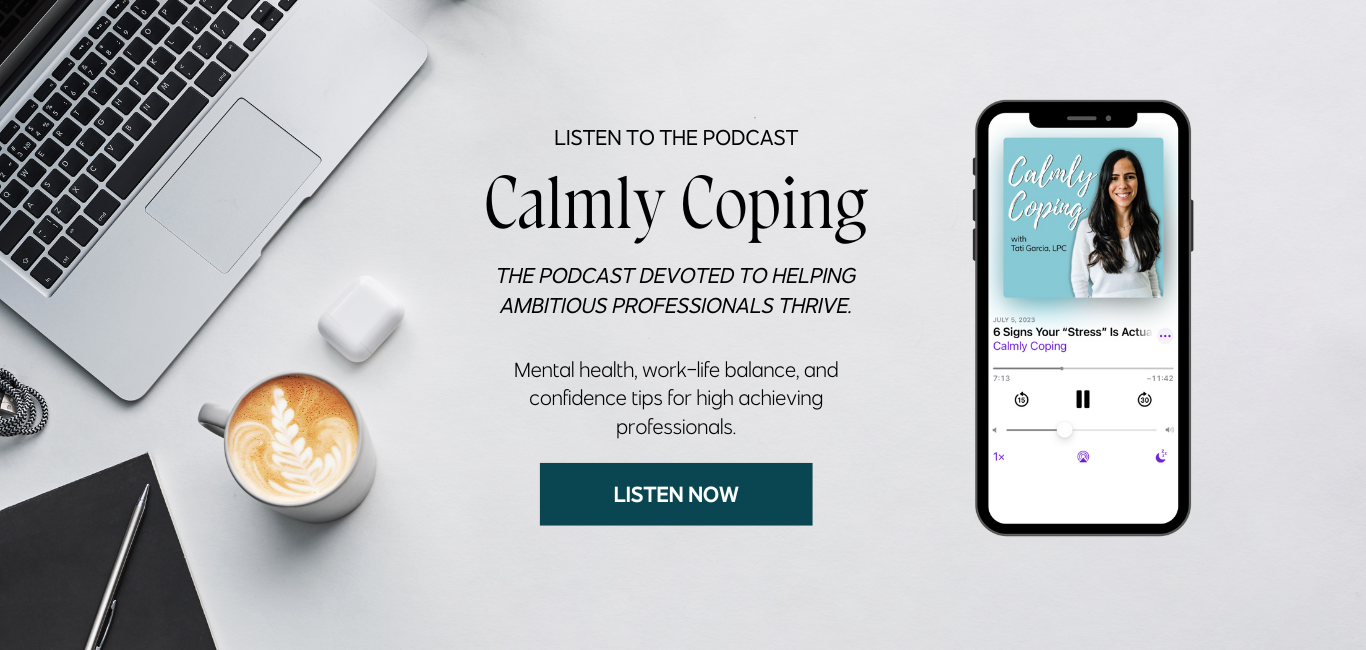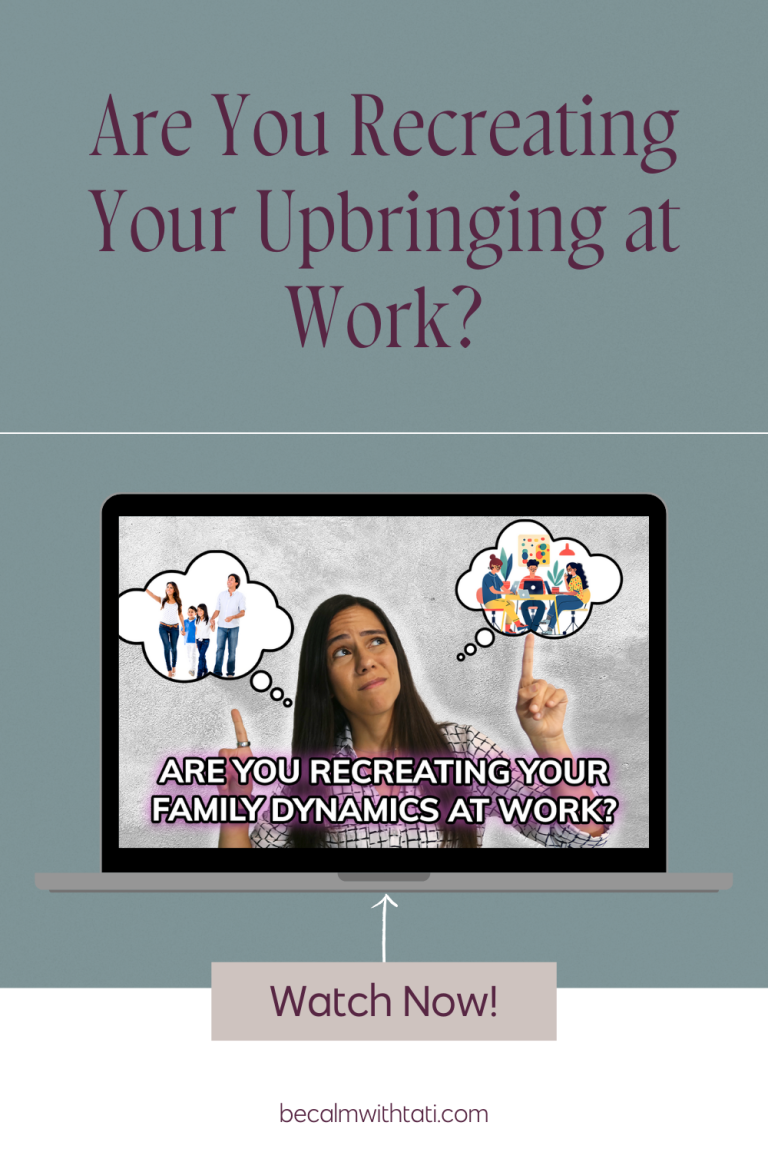Feeling behind at the end of your day, week, month, year, or your life? In this episode, I’ll be sharing exactly what to when you’re feeling behind during the big and the small moments, so you can go from feeling stuck to feeling inspired and motivated.
In this episode, you will learn:
- The P.A.C.E. strategy to motivate you to pivot when you’re feeling behind in the short-term
- Practical mindset shifts to help you feel calm and confident
- The R.E.A.L. approach to help you connect with deeper meaning and fulfillment so you can stop feeling behind in your life
LISTEN NOW:
🎧 CLICK HERE TO LISTEN TO CALMLY COPING WHEREVER YOU LISTEN TO PODCASTS
WATCH NOW:
💌 Subscribe to the Calmly Coping newsletter: Newsletter
💬 Submit a message, question, or suggestion to the podcast: Message
FREE TRAINING: Achieve A Calm Mind, Balanced Life, & Empowered Confidence in 90 Days
If you want to learn how to take back control of your life so you can feel calmer and more confident, and learn the tools to spend your time according to what matters most to you (no matter what your schedule is like right now)…

LISTEN, REVIEW, AND SUBSCRIBE TO THE PODCAST!

INTRO/OUTRO MUSIC: Rescue Me (Instrumental) by Aussens@iter (c) copyright 2018 Licensed under a Creative Commons Attribution (3.0) license. http://dig.ccmixter.org/files/tobias_weber/57990 Ft: Copperhead
DISCLAIMER: All content here is for informational purposes only. This content does not replace the professional judgment of your own mental health provider. Please consult a licensed mental health professional for all individual questions and issues.
Interested in diving deeper to get support for high-functioning anxiety?
I offer 1:1 coaching to help high-achievers overcoming high-functioning anxiety so they can feel calmer, more present, and have improved balance in their lives. Click here if you’re interested in learning more and getting started.
Calm, Balanced, & Confident is my comprehensive A→Z self-paced course to help high-achieving professionals overcome high-functioning anxiety so they can feel calmer, balanced, and more confident without the anxiety and overwhelm. Click here to learn more and enroll today.
Looking for ongoing support and guidance with high-functioning anxiety? The Calm & Ambitious Community is the exclusive community for high achievers with high-functioning anxiety. Click here to learn more and join us today!
TRANSCRIPT:
Click to view the episode transcript.
Feeling behind at the end of your day, week, month, year, or your life? In this episode, I’ll be sharing exactly what to do when you’re feeling behind during the big and the small moments so that you can go from feeling stuck to feeling inspired and motivated. Welcome to calmly coping. I’m your host, Tati Garcia.
I’m a licensed therapist and a high functioning anxiety coach. Calmly coping is the podcast for people who struggle with anxiety and high functioning anxiety. Each Wednesday, you’ll hear informative episodes with actionable tips about decreasing anxiety, adopting a healthy mindset and managing your time and energy.
So you can live a calm and balanced life. Let’s get started. Thank you so much for tuning in. Now this topic is important to address because when you feel behind it can negatively impact your mood, behaviors, and the way you think, which affects everything. This can result in further procrastination, being hard on yourself, feeling frustrated and disappointed in yourself, and can negatively impact your performance at work, in your relationships, and more.
Now I’m going to be sharing first the foundation, so things that you can do in general when you’re feeling behind. Then I’m going to dive into my framework for addressing short term feeling behind. So these are practical steps if you’re feeling behind in your day, week, month, etc. And then I’m going to dive into my framework for addressing the long term feeling behind.
So this includes feeling behind in your life. So first let’s look at the foundation. So The first step is to question. Question the feeling of feeling behind. Why are you feeling behind? Here are a few examples of why you might be feeling behind. And of course, this is not an exhaustive list. Maybe it’s, I didn’t get everything on my to do list done, something more short term.
I’m still living with my parents and all of my friends have moved out. I don’t have a job that pays as much as my peers. I didn’t meet my income goal for the year. I didn’t get that promotion. Or I missed a deadline. There can be many, many reasons why you’re feeling behind. And first, putting it into words can seem simple, but can then help to give you something to work with.
And this allows us to question this feeling. And one method of doing this is called Socratic questioning. And this is named after the Greek philosopher Socrates. And this is a method of asking open ended questions to help you to dive deeper into things. And it’s a technique that’s often used in psychotherapy.
Now we’re going to look at three questions specifically to help explore this feeling of being behind further. First, what is the effect of thinking or believing this? So let’s say if you’re thinking, I didn’t get everything on my to do list done. The effect is, okay, this is something that’s factual, and this is gonna maybe result in you feeling behind and discouraged, and it could help to get you motivated, but sometimes it can also results in you feeling even more overwhelmed.
What’s the effect of you thinking, I didn’t meet my income goal for the year? Again, you’re going to feel down, you’re going to be disappointed in yourself, and you might feel discouraged and feel like, I’m a failure. What’s wrong with me? If you didn’t get a promotion, or if you are comparing yourself to your peers and thinking, well, they’ve accomplished things that I haven’t, it’s okay.
inherently gonna result in you feeling deficient and feeling as though you are not able to do things in the best way that you could be doing. Another question that you can ask yourself is, what could the effect be of thinking differently? So what if you were to think, instead of, I didn’t get everything on my to do list done, maybe I wasn’t able to complete everything I set out to do.
Now that might seem like just a simple question, semantics. However, when you can phrase things a little differently, sometimes it can affect the way that you’re looking at the situation. You plan to do certain things and you didn’t complete those things. So it’s not that you fell behind or were deficient.
Maybe certain things came up, maybe you underestimated how long things took. And this is something that you can work with rather than the, um, I’m never getting the things done that I plan on doing, or I’m always falling behind with my tasks. These all or nothing statements can then make you take this personally and see this as a character flaw, or I’m not organized enough, rather than seeing this as something that is.
temporary and fixable again, what could be the effect of thinking differently when it comes to, I’m still living with my parents and I haven’t moved out. Well, if you were to think about it differently, you could think, okay, I am at a different phase in my life. I’m not at the place where my friends are and that’s okay.
Everybody has a different journey. And another question that you can ask yourself is to imagine another person. person. Maybe it’s somebody that you specifically know, friend or family member, or somebody that you don’t know that’s in the same situation. And if they viewed the situation that you are, what would you tell them?
What would you tell your friend who is feeling behind in life, or your friend who hasn’t accomplished what they think they should have? How would you speak to them? A lot of times it’s easier to pull from that place of looking at things from an outside perspective. And that’s what we’re come from a place of compassion and support, whereas when we’re looking at ourselves, we just are super hard on ourselves and are only looking at the negative and are only focusing on the flaws and the regrets and what I could have done differently, et cetera.
So one way to think of this is. You’re not a failure for not getting everything on your to do list done. This is just the normal part of being human, you know? Getting your to do list done doesn’t mean that you’ve won some magic award or that you are the human of the year. It’s just something that happens sometimes and doesn’t happen other times, and there doesn’t have to be any judgment or meaning attached to it.
Once you have questioned things a little, and an easy way to do this is to grab your journal, write down what you’re feeling behind about, and then dig into some of these questions. Then the next step is something that I kind of touched on a little bit when I was talking through these questions, but that’s identifying the underlying emotions behind what you’re feeling.
why you’re feeling the way you do. Because many times we can recognize the thoughts that are rattling around in our heads when we’re feeling stuck and behind, but we don’t always take the opportunity to acknowledge the emotions that are underneath them. This might seem like something that’s simple, surface level.
However, it’s not. Research supports that just the process of naming and labeling your emotions actually helps to reduce activation in the amygdala, which is the portion of the brain that’s responsible for processing emotions. And this can help to take away some of the sting when it comes to why you’re feeling a certain way.
This can help to put you in a place of feeling controlled by your emotions to feeling more mastery over them. This process is known as activation. affect labeling. And this allows you to also explore the underlying root causes, because a lot of times the reason why you’re feeling this way can be tied to a root feeling, a feeling inadequate, I’m not good enough, I’m flawed in some way.
And these are often what are called these core limiting beliefs that many of us Young in childhood, when we had negative experiences that we felt reinforced these beliefs that, you know, we didn’t perform the way we wanted to, or our parent or caregiver or teacher or coach gave us negative feedback or we were bullied or any of these experiences that can kind of reinforce this core belief of us being I’m not good enough.
And when you can tap into that, then that can give you space to explore and work through that. So some examples, I didn’t get everything done on my to do list. Maybe you feel inadequacy and overwhelm. If you’re still living with your parents and all your friends have moved out, maybe you’re feeling discouragement.
Again, inadequacy or deficiency and disappointment in yourself. Now, as you can see, there’s kind of a trend, a lot of these are related to feeling inadequate, deficient, but of course it’s going to be different for everybody. Maybe if you didn’t meet your income goal for the year, you might be experiencing a fear of failure or financial anxiety or disappointment in yourself or negatively comparing yourself to others.
And if you miss a deadline, maybe you’re experiencing Experiencing the fear of negative consequences or a fear of judgment from others. There could be many emotions that come up as a result of why you’re feeling the way you do. And this is step two in the foundation of working towards addressing that feeling of being behind.
Now we’re going to dive into the short term framework for what to do when you’re feeling behind in your day, week, month, year, etc. So this is the P. A. C. E. strategy. So it stands for P. Pivot, A. Adjust, C. Control, and E. Empower. So first we want to pivot, and this is adjusting your expectation and plans flexibly because in order to be resilient, and that is the ability to bounce back from difficult moments to deal with backsliding or things not happening the way that you expect them to, it’s important to be flexible and you can be flexible by adjusting your expectations and your plans, because that’s what you’re The reality is, things come up and you can’t always do things according to the way that you might have wanted to, whether it is in your control or out of your control.
So, for me, for example, I’m constantly changing my plans. You know, I make it a point to time block my schedule out and plan my tasks to go according to that, but things don’t always happen as planned. Things take longer than I expected them to. Unexpected things might come up. And so, I am constantly adjusting my schedule, and I don’t see that as something that’s a failure.
I see that as me failing. being flexible and me being pivoted. So rather than staying stuck in, and this used to be me in the past and many of the clients that I’ve worked with, where it’s like, this didn’t happen the way that I expected. And now I’m stuck and now I’m like anxious and discouraged for the rest of the day.
And I just am frozen. I don’t know what to do. And I’m just steeping in this disappointment and frustration. And this stops you from moving forward. Whereas, if you can accept. Things didn’t happen the way I wanted them to. Step out of the past and into the present and then ask yourself, okay, what can I do now?
And this is a skill that you can learn. This process of pivoting, this process of accepting I received a negative review and I’m not happy with that. What can I do now? It’s okay to feel discouraged and disappointed and that’s what you’re going to address in the foundation piece. And now let’s go into taking action.
That first step is really more of the planning and the identifying, all right, something needs to shift, something needs to pivot. The a piece is adjusting your. calendar, adjusting your plan. So this is the practical piece where we’re now planning out what needs to change. So this could be, you know, adding, adjusting your calendar, and your to do list.
This can be looking at the goals you set for last year and then reassessing, okay, based on this data, now I’m going to adjust my plan and my projection for this year. And this is about creating realistic goals. And also if it involves. time, and you know, time is the reason why things didn’t go according to plan, or you’re feeling behind, then Maybe this includes adding buffers or overestimating how long something is going to take you.
So this is when you’re getting into the nitty gritty, going in, adjusting your plans, and not taking it personally. And the benefits of this are not just practical of creating an actual plan, but they’re also psychological. Because when you can get something out in writing and have a clear Adjustment of things didn’t go according to plan.
This is what I’m going to do moving forward. It gives you more clarity and a sense of control rather than feeling stuck in I’m behind and then tomorrow I’m going to be behind and then the next day. And then it’s just this never ending, always feeling like it’s never enough. The C in pace is for controlling what you can.
And this is about focusing on effort and not outcomes. There are many reasons why we might be feeling behind at this point. that you don’t have control over. Maybe you put a lot of work into something, but it didn’t turn out the way that you expected it to, whether it’s a project or a relationship or anything else in your life.
Maybe when we’re talking about not meeting income or sales goals or anything that’s financial, a lot of times you don’t have control over a big piece of this. You can put the work in to do as much as you can, but you can’t necessarily control how many people buy from you or how many sales you make or how many clients you get.
And when we’re focusing on things that we can’t control and putting all of our effort on that and then measuring our worth by that, that’s going to inevitably result in us feeling helpless. When we bring the focus back to what we can control, on our effort. We are bringing things back into the driver’s seat so that you can make practical decisions.
And not only that, but also focus on the small actions that you can take daily to help you to work towards those goals and the plan that you identified in the P and the A. part of the formula. So this includes identifying these small daily actions that you can take, focusing on the things that you can do small, little by little to build up and work towards meeting those goals that you have.
And the E stands for empowering momentum. This is all about celebrating those small, small wins to build progress and is an often overlooked piece, especially in the high achieving individuals I work with. However, I’m sure it’s common in many people. And that is because we tend to focus on the negatives.
We tend to focus on what’s not enough. Why haven’t I reached the goal that I want? Or even if you do reach a goal, then it’s like, what’s next? And it’s this never ending hamster wheel of doing more and more and more and never actually feeling fulfilled and never actually acknowledging how far you have come.
And the reality is that even if you are feeling behind, I’m sure there’s so many things that you are doing that are right. I love always returning to this statement of there is more right with you than wrong with you. And so this can include focusing on what you have accomplished. Even if it’s nothing, even if you needed to take a day off to take care of yourself, that is recovering.
That is something that you are accomplishing, listening to yourself and an investment in your future self so you can come back stronger. I was recently watching an episode of the show The Dog Whisperer. I think it was an old episode because it was up on YouTube, but Cesar Millan, who is The Dog Whisperer, he is the trainer, he said something that really resonated and he said, see the pennies, not just the money.
the thousand dollars and what he’s referring to is rather than just looking for the bigger goals and those huge accomplishments that we often might take time to celebrate and acknowledge and look forward to those little pennies along the way are what build to help you to reach those thousand dollars and you can’t get there without it.
out those small pennies and those little steps that you’re putting in every single day. And this is important to help you build momentum, build confidence, and get you out of a place of feeling stuck. Now that we’ve talked about the short term framework for what to do when you’re feeling behind in your day, week, month, or year, let’s move on to the long term framework.
This is the REAL approach. The R stands for reflect. Reflecting on meaning. What does behind actually mean? Maybe you aren’t where you thought you would be, you haven’t accomplished as much, don’t have as much free time, you don’t have the kind of relationships you’ve wanted. Behind ultimately is a judgment and not a fact.
The reason why it’s a judgment, especially when we’re looking at feeling behind in life, is because there is no judgment. What does it actually mean to be behind? Maybe you are returning to college as an adult, and you might think I’m behind in life because I didn’t do this before. But is that really behind?
That is just a judgment you’re making because you’re comparing yourself to the way that other people are doing things. But just because other people are doing things a certain way doesn’t mean that that’s a bad thing. the right way to do things. It’s just that that is the maybe normally accepted way to do things, but that’s not the right or even the best way to do things.
And ultimately, as cheesy as this sounds, we all have our own path in life. And really the idea of being behind is Is only relative it’s only relative to those people around you But when you can bring it back to yourself in your own journey There is no being behind because you are doing life in the best way you can right now And that’s all you can do The more that you focus on the idea of being behind, then the more that that’s just going to leave you feeling crappy about yourself.
It’s not going to help you to actually work towards the goals that you want or accomplish the things that you want. And a lot of times that’s what we can unconsciously believe. We feel like, all right, if I’m down and discouraged and I’m beating myself up, that’s going to give me the motivation to move forward.
forward and to do more and to push harder and sometimes that can work, but it only works up to a point. And it’s really only where you are pushing yourself from a place of deficiency. And where’s that really going to get you? It’s not going to change how you feel about yourself. It’s just going to put you in another place, reaching another goal, still feeling deficient on the inside.
So this is really about. Questioning these ideas and expectations that we have for ourselves that other people might have for us and flipping it on its head and transforming from the inside out and realizing that that’s the only way that you can truly reach and achieve fulfillment, not from doing things according to some timeline or according to the way you think other people expect from you or that you might even expect from yourself because you’re A lot of times we internalize this timeline of this is how things should be, but doing things from your own desire, from your own personal fulfillment.
So is it possible in this reflecting on this meaning behind being behind, no pun intended, can you have compassion? You’re doing the best that you can, and you can’t change the past. So can you focus on gratitude for who you are, for what you already have in your life, and for building momentum towards creating the life that you love?
Every day, in small ways, not by making huge changes, but by time over time, building up and adding to those pennies. The E stands for examine comparisons. This is a big one when it comes to feeling behind. But are you comparing yourself unfairly to other people? Are you in this place of comparison itis?
Whether it’s comparing yourself negatively to your neighbors, your friends, your family, or those on social media that you don’t even know. It’s only natural to compare yourself to others. It’s part of being human, but a lot of times it’s not accurate, right? Especially if we are only paying attention to the things that people share with us on the surface.
You’re not seeing a full picture of somebody else’s life. Therefore, it’s very cliche, but you’re only comparing your life to somebody else’s highlight reel. You’re not seeing the ups and downs that they experience on a day to day basis. You’re not seeing the hollowness that they might feel behind those six figure years.
You’re not seeing or experiencing the daily fights that they might be going through in that happy marriage. You know, there are so many things that we see on the outside and these beautiful pictures and shares that people make, but it’s not the whole picture. And it’s not to say that everybody’s miserable, but it’s just to say that everybody is human.
right? And part of being human is experiencing ups and downs and experiencing struggles and even, you know, that’s why even the most successful people, even the richest or the most famous people or the people in the quote unquote happiest relationships that you might strive to be like, even they struggle, even they suffer and have hard days and may even be unhappy with their lives.
And this is important to give you some perspective and to realize that what are you actually comparing yourself to? Are you just thinking when I achieve this milestone, then I’ll be happy like this person. How do you know they’re actually happy? Maybe they are, but maybe that’s if even if they are happy, maybe that’s not the right choice for you, or maybe it’s not the best choice right now.
When we compare ourselves to other. Again, another cliche, but comparison is the thief of joy. When you compare yourself to others, I keep saying all these lines and this is just coming to me and I didn’t write this down. So everybody does things on their own time and there is no perfect timeline. So check your comparisons.
This can include even recognizing when you’re being triggered. Maybe it’s when you’re going on Instagram and maybe that can include unfollowing accounts that make you feel worse about yourself or like you’re feeling behind. Or maybe it’s when you’re watching the show on Netflix and you’re seeing the The perfect home that they have and thinking, why doesn’t my house look like that?
And maybe that means limiting how much you’re viewing those things because you can control what you expose yourself to, because those things can influence the way you feel about yourself. And it’s not about hiding in a cave or shielding yourself from anything that’s going to make you feel worse. But it’s about being intentional with.
what you’re consuming so that you can focus on consuming things that help you feel hopeful, more motivated, and not as much of the things that are going to make you feel like you’re constantly behind and never catching up. The A in real is align with values. This is about reconnecting with what truly matters to you personally.
Personally, like I mentioned before, you’re maybe you’re striving for that thing that the person you’re seeing on social media has, and maybe that’s what you think you might want. But if you reflect a little deeper, maybe it’s not the thing that’s right for you at this moment in time, or maybe there’s other things that are also important to you.
So the only way that we can really truly understand what is going to bring us meaning and fulfillment is by identifying what are those things that are personally fulfilling to you. This can happen through identifying your values. So, when we’re talking about values, these are the things that are meaningful to you.
These are the guideposts in your life that help to inform the day to day decisions that you make. So maybe for you, it’s family. Maybe it is creativity. Maybe it is time freedom. Maybe it is friendships. There’s so many things that we can personally value. An easy way to identify this is to look at your values.
And I shouldn’t say easy, but this might give you a direction, is to just Google a list of values. And this can help to get the gears turning. And then once you’ve identified these values, I think sometimes it can be helpful for many people to identify anywhere from three to five. Then ask yourself, are you spending your time in alignment with these values?
Now, it’s not always going to be possible to be doing this a hundred percent of the time because we all have responsibilities and things that we have to do in order to achieve the things that we need and that we desire in life. However, as a whole, if you’re spending all your time working overtime and burning yourself out and one of your most important values is family and you have no time for your family, then there’s a disconnect.
Connect there. So are there things that you can do to shift that so that you are then living more in alignment with your values and getting to the root of why you might be feeling behind in your life? And this then connects to taking the small steps. So kind of drawing from the pace framework that we talked about in the short term, but these small actions that you can take daily, building up those pennies and looking at, all right, you’re not living in alignment with your values and the way that you want to be.
What’s one step you can take this week? next week, the following. This isn’t going to happen overnight, but it’s about reflecting and making intentional shifts so that those pennies will add up over time. And the L in the real framework is let go of control. Now this is kind of the antithesis of what I spoke about before, where I talked about focusing on what you can control.
This piece is also, it’s kind of It shouldn’t say the antithesis. It’s the other side of it. It’s the other half. It’s letting go of what you can’t control. Because many times we might feel behind because of things that are outside of our control. So, let’s say if that includes when you’re gonna find the right partner for you, or the right job, or achieve those income goals.
There are many things that are outside of our control, the sooner that we can recognize that and let go of, okay, it doesn’t matter if you go on a date tomorrow or in six months, you might meet somebody at a time that is completely outside of your control because that’s how it happens. Same thing with finding the right job for you, et cetera.
Do what you can and let go of the rest rather than feeling like I don’t have this Thing and I’m feeling behind but this is something that I’m doing everything I can but it’s just not happening for me Beating yourself up for that isn’t gonna make that thing happening more quickly It’s not gonna make you feel any better about not reaching that goal.
And so Recognizing and remembering that you are exactly where you need to be and this is important You Because there is no behind at the end of the day, the moral of the story, and we’re all doing the best that we can and the more that we can focus on healing from within, then the more positively that’s going to not just influence ourselves, but it’s going to influence the others around us, the more that you can model that way of thinking for the ones that you love and the ones that you care about and the ones that you work with.
Now I want to give a quick update and I appreciate anybody who has checked out the episode for this long for anybody who is a previous listener of the podcast or maybe if you’re new here and you just want to hear about what’s my plan moving forward. So I’m recently coming off of a break. I took a break from the podcast for about a month and I’ve been doing this podcast since 2020.
And during this time, it allowed me to reflect, to reassess, and to really identify what I want to be doing moving forward. And for the longest time, I’ve been releasing weekly episodes, and at a certain point, it comes to feel like I’m this content turning machine and just creating things really quickly just to get them out.
And I felt like that wasn’t resonating. You know, especially with me personally, I’m the kind of person that it can take time for me to think through things and plan through things. And when I was on this weekly deadline of releasing episodes, I didn’t have that time that I would have liked to create something that was up to the quality that I would have liked, which hopefully, you know, it was reflected more in in this episode.
That’s what I plan on doing and hope to do moving forward. And in order to do that, I’m going to reduce the frequency of my episodes from once a week to every other week. And this, I hope, is going to allow me the space to focus on creating more quality content rather than quantity. And I’m hoping that this will then, you know, with these more quality episodes will give you something more to focus on and to work through and to take your time with rather than, you know, the content overwhelm that we probably are all experiencing.
So I’d love to hear your thoughts on this change. If you’re somebody who’s been here for a while or you’re just joining me recently, the shift from weekly to bi weekly episodes. And anybody who has been here for a while or is just joining me today for this episode, I thank you so much for being here and spending your time with me.
It really means a lot to me. On that note, if you’re interested in getting informed, getting notified when I release new episodes, please be sure to subscribe wherever you are watching or listening. So whether it is on YouTube, Spotify, wherever you’re listening to podcasts, any support really means the world.
And if you can also rate review or leave a comment again, based on where you’re listening, because that really helps not just me to know how I’m doing, but then it also helps my podcast to reach others so that they can benefit from this information as well. If you’re interested in staying in touch on my behind the scenes, when I release new episodes and all of that, I have a weekly newsletter that you can subscribe to by going to calmlycoping.com/newsletter and you can get all of the behind the scenes notifications. While you wait for the next episode, I have other episodes about calming your mind, improving your work life balance, and feeling more confident from within. Thank you so much for tuning in today, and until next time, be calm.
Thanks so much for listening. If you like what you heard, please share this episode with a friend. And please subscribe and leave me a review on iTunes. Also, remember to check me out online at CalmlyCoping. com and connect with me on Instagram at TatianaGLPC. All content here is for informational purposes only.
This content does not replace the professional judgment of your own mental health provider. Please consult a licensed mental health professional for all individual questions and issues. Till next time, I’m Tati, and this has been Calmly Coping.


Until next time…













